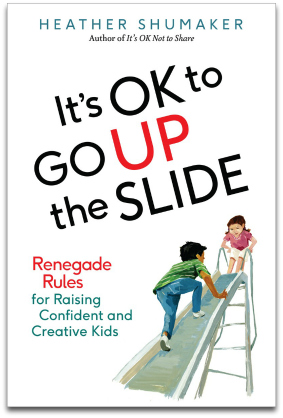 I’ve ceased to be amazed that kindergarteners have homework, but I was startled to hear that one little tyke faced homework assignments not just from school, but also from his Extended Day after-school program. Even Sunday schools are starting to give homework.
I’ve ceased to be amazed that kindergarteners have homework, but I was startled to hear that one little tyke faced homework assignments not just from school, but also from his Extended Day after-school program. Even Sunday schools are starting to give homework.
If you have a preschool or school-aged child, undoubtedly, you’ve felt the homework pressure. Homework is a nightly conflict and emotional vortex for so many families. I showed a picture at a recent conference of a six-year-old crying and squirming at the kitchen table, a homework worksheet before him. “That’s my life every night,” people told me.
What’s amazing is that homework for young children has no academic benefit. That’s right. A comprehensive analysis of 180 different research studies on homework concluded that homework has no academic benefit to children in elementary school. Even in middle school it has a marginal benefit. Homework helps, but its benefits are highly age dependent. Homework does give high school students an academic boost, but only in moderation (no more than two hours a night).
It does have an impact, however. Homework doesn’t help boost academics at the elementary level, but it does cause kids to develop negative attitudes toward school. What an awful combination.
These studies were done by Dr. Harris Cooper, a psychologist and neuroscientist from Duke University. Cooper himself believes a little homework is good at young ages (he’s the one who devised the 10-minutes-per-grade rule), but Cooper’s belief is just that. A belief. His own research doesn’t back him up (see also Alfie Kohn’s research on the research).
Knowing this, knowing my children, and knowing my fair share of child development, I had confidence to tell my kids’ teachers that our family would not be participating in homework. “You can do that?!” people cry. Well, yes. You’re the parent. Schools seem as if they control family life after school hours, but they do not. You can opt out.
We’ve banned homework in our household for the elementary years. Six teachers and two schools later, it’s working. We talked to the teachers and let them know our reasons and our learning philosophy. Some agreed and enthusiastically supported us. Some balked but accepted it, saying “Well, he’ll get a zero in social studies.” Zeros in social studies don’t matter when you’re in first grade. Meeting the child’s needs does.
Children this age simply have better things to do. School focuses on the cognitive, academic, sitting down side of things. When school is out, kids need time to move, explore, run outside, make faces at their siblings, play and help with family chores. They need a break from being told what to do. They desperately need time to unwind and play, following their own ideas. Kids need time to be themselves again.
We know this, but still, we tend to act as Homework Enforcers. It seems rude or simply impossible to question the teacher’s authority. So, night after night, parents turn into Homework Cops, monitoring homework, reminding kids, cajoling, begging and sometimes breaking down and doing the homework for kids. It’s a direct clash of authority: the teacher’s authority versus the parent’s authority. Who wins?
The child needs to win. As guardians of our children, we adults need to take the courageous step of talking to each other, explaining what’s not working, what we hope to achieve, and how we can get out of this mess.
Bucking the system can be outright terrifying. But when the system’s wrong, it needs to be questioned. What’s more, accepting the role of Homework Cop early on means that you will likely remain Homework Cop through the high school years. Parent: Nag who bosses, controls and interferes. Child: Grumbler who avoids working at all costs until forced to by a parent/ teacher/ boss.
When is homework OK?
In elementary years
- When it’s joyful
- When it increases the child’s interest in school and learning
- When it’s rare (1-3 times a year)
- When it’s reading for pleasure
- When it’s optional
- When there’s no “you’ll miss recess” threats accompanying it
- When there’s no parent signature required
- When it’s independent. The child can do the assignment herself. Adults are only involved because of a child’s desire to share.
Later years
- When there’s a bit of ‘practice’ homework in middle school
- When it enhances learning, not busy work
- When it’s two hours or less per evening in high school
 My new book was born out of the crisis of homework. It’s OK to Go Up the Slide covers ideas and sample scripts for opting out of homework and gives support to teachers and principals as well as families. It also tackles 20 or so other topics like recess, kindergarten, princess play, teasing, risk, empathy, sad stories, calendars at circle time, and technology, and includes chapters like “Safety Second” and “It’s OK to Talk to Strangers.” It’s not a typical parenting book. It’s a questioning book that offers real answers to some of the highest stresses in our family lives.
My new book was born out of the crisis of homework. It’s OK to Go Up the Slide covers ideas and sample scripts for opting out of homework and gives support to teachers and principals as well as families. It also tackles 20 or so other topics like recess, kindergarten, princess play, teasing, risk, empathy, sad stories, calendars at circle time, and technology, and includes chapters like “Safety Second” and “It’s OK to Talk to Strangers.” It’s not a typical parenting book. It’s a questioning book that offers real answers to some of the highest stresses in our family lives.
The 2-Minute Action Plan for Fine Parents
Take a look at the impact of homework in your house. How does your child react? Is she eager? Does he enjoy the homework time of day? Children are wired to explore and love learning – is homework enhancing or diminishing this joy?
Although research says homework does not help kids, there’s something simple and obvious that does. Sleep. If you want to boost academic learning, memory, focus and behavior in the classroom, give children extra-long sleep. Sleep for elementary-aged children is 9-13 hours a night (that’s 9-11 hours for older elementary and 10-13 hours for the younger ones) according to the National Sleep Foundation. Does your child ever stay up too late because of schoolwork?
The Ongoing Action Plan for Fine Parents
Do some research. You might start by asking your child this: what happens at school if you don’t complete your homework? Don’t be surprised if you hear the dreaded answer: you’ll miss recess if you don’t. If homework is harming your family time or family relationships, take some time to consider your feelings about authority figures. How many times have you enforced homework in your house just to avoid the idea of challenging the teacher? Then reframe the question in your mind. The teacher and the school are not authorities, they are partners. Your partners. So, get up your courage to talk together. True partners tell each other when something’s wrong.
Hi! Do you have a citation for this?
“A comprehensive analysis of 180 different research studies on homework concluded that homework has no academic benefit to children in elementary school.”
I’m gathering research before I speak with my child’s teacher, as our school has a pro-homework policy in place. 🙁
Check out the full chapters and references in It’s OK to Go Up the Slide. Also Alfie Kohn’s work. Best of luck to your family!
What an interesting piece, thank you so much for sharing it. I’ve never read one quite like it and it’s given me a lot to think about.
My kids attend a K – 8 Public Montessori school, and part of what appealed to me about it was that in Montessori they believe you are supposed to learn other things when you’re at home (like helping with dinner, or taking music lessons, etc.), so generally homework isn’t part of the program. My son is in third grade and homework has always been optional, and he has always opted out. This has left us time to take him to Latin and piano and just let him explore new things on his own. In 4th through 6th grade they start getting homework packets, and I like how they do it because it’s a few pages of reading comprehension and math and the kids have all week to work on it. They can pace themselves as they see fit, so that seems like a reasonable introduction to doing work outside of the classroom. One of my daughters does well with it, and the other not so much.
We’re struggling with our oldest as she’s finishing 8th grade and preparing for high school. They try to transition the kids to more traditional learning approaches so that they will be prepared when they leave Montessori. My daughter hates it. She’s is in a habit of not handing in homework. She does it, but doesn’t finish it or have it ready on time, so she just chooses not to turn it in. Her teachers go out of their way to find evidence of what she knows (often with impromptu oral exams), but I know starting at her new school nobody is going to have the patience for that. I’m worried for her, although I’m sure she’ll figure out how to get by. Homework every night is going to be a tough transition for all of us, I think.
It is interesting, isn’t it?
I had no idea you could “opt out” of homework (unless the school gave that option)! I personally wouldn’t do this (as we discussed here earlier), but I find it fascinating!
While I agree with some of Heather’s renegade rules (“Recess is a Right”, “It’s OK Not to Kiss Grandma”), I don’t agree with others (to me it’s NOT OK to go up the slide unless you are the only one on the playscape), and yet I find myself wanting to read the book… some rules will validate what I believe in, and others will broaden my perspective. Win- Win 😉
Love your open attitude, Sumitha. If only every parent could say “Some rules will validate what I believe in and others will broaden my perspective. Win-Win.” What a wonderful world it would be.
It’s also so true that we come to realization about kids and parenting at different times. If we’re attentive, the children will lead us there.